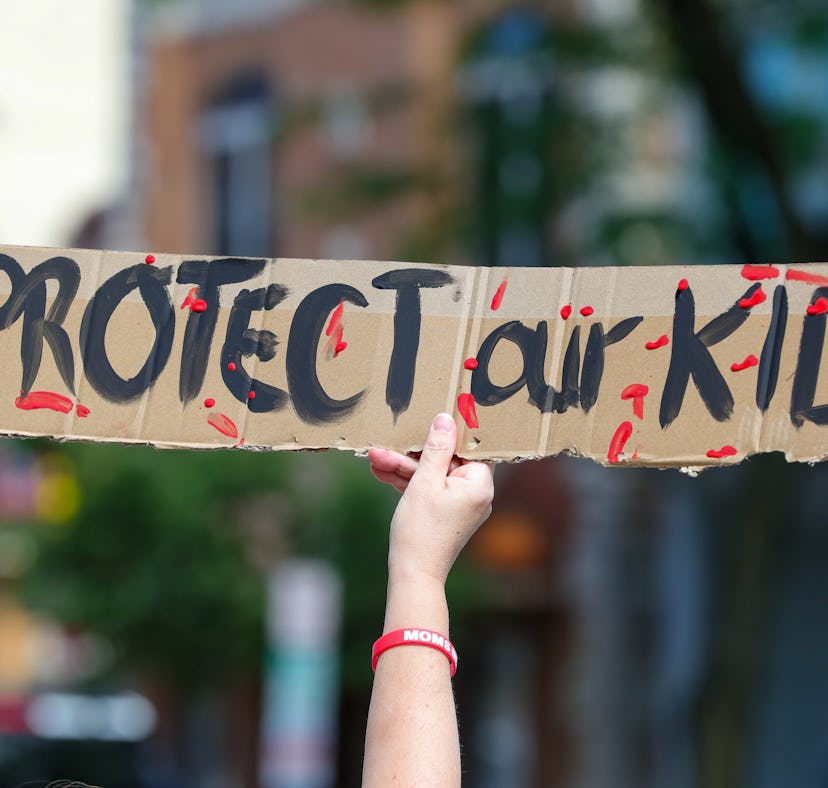
The Number Of Gen Zers Who've Experienced Gun Violence Is, Uh, Not Good
Big yikes.
Gun violence in the United States is way too common — so common, in fact, that it’s directly touched the lives of millions of teens and young adults across the country. According to a new survey from gun safety education organization Project Unloaded, released on Sept. 28, a troubling number of Gen Zers say they’ve had direct experience with gun violence in some form. Everyone knew it was bad, but these numbers really drive the point home.
According to the survey, 30% of the teens and young adults polled had experienced gun violence personally, while another 24% know a friend or family member who has. The survey separated these experiences into categories like being shot at directly, experiencing a mass shooting, experiencing an accidental shooting, or experiencing a gun brought to a school or workplace. Even in individual categories, the answers were troubling: More than one-quarter of the respondents said that they or someone they knew personally had been shot at. Meanwhile, 10% of those who responded said they or someone they knew had experienced a school shooting.
The disproportionate impact of gun violence and mass shootings on Black and brown communities was also evident: More than 60% of Black and Hispanic respondents said they or a friend or family member had personally experienced gun violence. The survey, conducted with Global Strategy Group, polled 1,000 teens and young adults ages 13 to 25, “to understand how young people, particularly Gen Z, think about guns and gun violence,” per a release shared with Elite Daily.
This survey also found that gun violence is a particularly pressing issue for Gen Zers. Half of young people reported that they think about mass shootings on a weekly basis, while 51% reported that they saw it as an “important problem.” It was one of the top three issues respondents said they worried about, after mental health and cost of living. There’s a reason why it’s top of mind — according to data from the Gun Violence Archive (GVA), gun-related violence is only becoming more and more common. Between 2014 and 2020, the average number of mass shooting events increased from 269 to 611 per year, and as of September 2022, the GVA has counted at least 500 mass shootings this year.
“If you live in a community like mine, it's easy to believe that you're safe and unlikely to experience gun violence firsthand,” Project Unloaded youth council member Jacob Hoyt, 17, tells Elite Daily. Located in Highland Park, Illinois, Hoyt survived the 4th of July parade mass shooting in Highland Park this summer. “But that's what's so terrifying about gun violence — we're all safe right up until we aren't. And in a nation with roughly 400 million guns, we're all at risk of being shot at, or knowing someone killed by gun violence.”
“To stop the violence, we need to stop the myth that more guns make us safer,” Hoyt added. “If that were true, we'd be the safest nation on Earth. Instead, gun violence is the number one killer of American children and teens.” According to CDC data, as of 2020, the most recent year for which data is available firearms are the leading cause of death for children in the United States — more than motor vehicle deaths, the previous leading cause of death.
“Still, there's reason to hope,” Nina Vinik, founder and executive director of Project Unloaded, said in the press release. “When presented with the facts about the risks of using guns, young people in all demographic groups shifted their views against seeing guns as a means of protection. The research shows that it’s possible to shift the culture around guns, and that will save lives.” Around the country, young activists are still stepping up and taking action to fight gun violence in their communities and nationally — and in recent months, there’s finally been some movement at the national level, too. If you want to know more about what you can do to help, activists have shared their best advice.